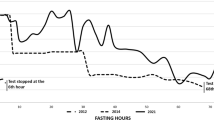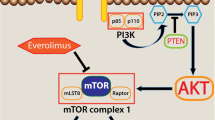Abstract
Insulinoma is a rare pancreatic neuroendocrine tumor (pNET) potentially associated with severe hypoglycaemic crisis. The great majority of these tumors are benign. In patients with metastatic malignant insulinoma, systemic therapies aim to control both the syndrome and tumor growth. Everolimus is a drug approved for the management of advanced pNETs that can achieve both these goals. According to international guidelines and regulatory authorities, everolimus in patients with pNET should be continued until the demonstration of disease progression with standard radiologic imaging techniques. The drug is neither recommended nor authorized beyond progression. This could not be the case of advanced insulinoma patients since the antineoplastic and the glycaemic effects of everolimus seem to follow independent mechanisms. The authors present here their point of view in favor of continuing everolimus beyond progression in symptomatic insulinoma patients on the basis of a robust rationale and describing a case.

Similar content being viewed by others
References
M. Anlauf, N. Garbrecht, J. Bauersfeld, A. Schmitt, T. Henopp, P. Komminoth, P.U. Heitz, A. Perren, G. Klöppel, Hereditary neuroendocrine tumors of the gastroenteropancreatic system. Virchows Arch. 451(Suppl 1), S29–S38 (2007)
P. Iglesias, J.J. Diaz, A clincal upted on tumor induced hypoglicemia. Eur. J. Endocrinol. 170, R147–R157 (2014)
E. Baudin, P. Caron, C. Lombard-Bohas, A. Tabarin, E. Mitry, Y. Reznick, D. Taieb, F. Pattou, P. Goudet, D. Vezzosi, J. Scoazec, G. Cadiot, F. Borson-Chazot, C. Do Cao, Malignant insulinoma: recommendations for characterisation and treatment. Ann. d’Endocrinologie 74, 523–533 (2013)
M.E. Pavel, J.D. Hainsworth, E. Baudin, M. Peeters, D. Hörsch, R.E. Winkler, J. Klimovsky, D. Lebwohl, V. Jehl, E.M. Wolin, K. Öberg, E. Van Cutsem, J.C. Yao, Everolimus plus octreotide long-acting repeatable for the treatment of advanced neuroendocrine tumours associated with carcinoid syndrome (RADIANT-2): a randomised, placebo-controlled, phase 3 study. Lancet 378, 2005–2012 (2011)
J.C. Yao, M.H. Shah, T. Ito, K. Lombard Bohas, E.M. Wolin, E. Van Cutsem, T.J. Hobday, T. Okusaka, J. Capdevila, E.G.E. de Vries, P. Tomassetti, M.E. Pavel, S. Hoosen, T. Haas, J. Lincy, D. Lebwohl, K. Öberg, Everolimus for advanced pancreatic neuroendocrine tumors. N. Engl. J. Med. 364, 514–523 (2011)
J.C. Yao, N. Fazio, S. Singh, R. Buzzoni, C. Carnaghi, E. Wolin, J. Tomasek, M. Raderer, H. Lahner, M. Voi, L. Bubuteishvili Pacaud, N. Rouyrre, C. Sachs, J.W. Valle, G. Delle Fave, E. Van Cutsem, M. Tesselaar, Y. Shimada, D. Oh, J. Strosberg, M.H. Kulke, M.E. Pavel, Everolimus for the treatment of advanced, nonfunctional neuroendocrine tumours of the lung or gastrointestinal tract (RADIANT-4): a randomised, placebo-controlled, phase 3 study. Lancet 387(10022), 968–977 (2016)
F. Panzuto, M. Rinzvillo, N. Fazio, F. De Braud, G. Luppi, M.C. Zatelli, F. Lugli, P. Tomasetti, F. Riccardi, C. Nuzzo, M.P. Brizzi, A. Faggiano, A. Zaniboni, E. Nobili, D. Pastorelli, S. Cascinu, M. Merlano, S. Chiara, L. Antonuzzo, C. Funaioli, F. Spada, S. Pusceddu, A. Fontana, M.R. Ambrosio, A. Cassano, D. Campana, G. Cartenì, M. Appetecchia, A. Berruti, A. Colao, M. Falconi, G. Delle Fave, Real-world study of everolimus in advanced progressive neuroendocrine tumors. Oncologist 19, 966–974 (2014)
M. Falconi, B. Eriksson, G. Kaltsas, D.K. Bartsch, J. Capdevila, M. Caplin, B. Kos-Kudla, D. Kwekkeboom, G. Rindi, G. Klöppel, N. Reed, R. Kianmanesh, R.T. Jensen, And all other Vienna Consensus Conference participants. Consensus guidelines update for the management of functional p-NETs (F-p-NETs) and non-functional p-NETs (NF-p-NETs). Neuroendocrinology 103(2), 153–171 (2016)
M. Pavel, K. Oberg, M. Falconi, E. Krenning, A. Sundin, A. Perren, A. Berruti, Gastroenteropancreartic enuroendrocine neoplasm: ESMO clinical practice guidelines for diagnosis, treatment and follow up. Ann. Oncol. S0923–7534(20), 36394–36398 (2020)
A. Barthel, D. Schmoll, Novel concepts in insulin regulation of hepatic gluconeogenesis. Am. J. Physiol. Endocrinol. Metab. 285, E685–E692 (2003)
A. Veltroni, E. Cosaro, F. Spada, N. Fazio, A. Faggiano, A. Colao, S. Pusceddu, M.C. Zatelli, D. Campana, A. Piovesan, A. Pia, E.M. Grossrubatscher, A. Filice, A. Bianchi, P. Razzore, M. Toaiari, S. Cingarlini, L. Landoni, R. Micciolo, M.V. Davì, Clinico–pathological features, treatments and survival of malignant insulinomas: a multicenter study. Eur. J. Endocrinol. 182, 439–446 (2020)
A. Giustina, G. Mazziotti, F. Maffezzoni, V. Amoroso, A. Berruti, Investigational drugs targeting somatostatin receptors for treatment of acromegaly and neuroendocrine tumors. Expert Opin. Investig. Drugs 23(12), 1619–1635 (2014)
E. Raymond, L. Dahan, J.L. Raoul, Y.J. Bang, I. Borbath, C. Lombard-Bohas, J. Valle, P. Metrakos, D. Smith, A. Vinik, J.S. Chen, D. Hörsch, P. Hammel, B. Wiedenmann, E. Van Cutsem, S. Patyna, D.R. Lu, C. Blanckmeister, R. Chao, P. Ruszniewski, Sunitinib malate for the treatment of pancreatic neuroendocrinetumors. N. Engl. J. Med. 364(6), 501–513 (2011)
A. Demirci, O. Bal, A. Durnali, A. S. Ekinci, O. Esbah, N. Alkis, B. Okszoglu, Sunitinib-induced severe hypoglycemia in a diabetic patient. Oncol. Pharm. Pract. 20(6), 469–472 (2014)
A. Fountas, S. Tigas, Z. Giotaki, D. Petrakis, G. Pentheroudakis, A. Tsatsoulis, Severe resistant hypoglycemia in a patient with a pancreatic neuroendocrine tumor on sunitinib treatment. Hormones 14(3), 438–441 (2015)
A. Berruti, A. Pia, M. Terzolo, Advances in pancreatic neuroendocrine tumor treatment. N. Engl. J. Med. 364, 19 (2011)
B. Verges, B. Cariou, mTOR inhibitors and diabetes. Diabetes Res. Clin. Pract. 110, 101–108 (2015)
M. Asayama, T. Yamada-Murano, H. Hara, A. Ooki, M. Kurosumi, K. Yamaguchi, Everolimus dramatically improves glycemic control in unresectable metastatic insulinoma: a case report. Jpn. J. Clin. Oncol. 44(2), 186–190 (2014)
V. Bernard, C. Lombard-Bohas, M. Taquet, F. Caroli-Bosc, P. Ruszniewski, P. Niccoli, R. Guimbaud, C.N. Chougnet, B. Goichot, V. Rohmer, F. Borson-Chazot, E. Baudin, Efficacy of everolimus in patients with metastatic insulinoma and refractory hypoglycemia. Eur. J. Endocrinol. 168, 665–674 (2013)
S. Di Paolo, A. Teutonico, D. Leogrande, C. Capobianco, P.F. Schena, Chronic inhibition of mammalian target of rapamycin signaling downregulates insulin receptor substrates 1 and 2 and AKT activation: a crossroad between cancer and diabetes? J. Am. Soc. Nephrol. 17, 2236–2244 (2006)
H. Fiebrich, E.J.M. Siemerink, A.H. Bouuwers, T.P. Links, W.S. Remkes, G.A.P. Hospers, E.G.E. de Vries, Everolimus induces rapid plasma glucose normalization in insulinoma patients by effects on tumor as well as normal tissues. Oncologist 16, 783–787 (2011)
L. Suzuki, T. Miyatsuka, M. Himuro, R. Nishio, H. Goto, T. Uchida, Y. Nishida, A. Kanazawa, H. Watada, Everolimus directly suppresses insulin secretion independently of cell growth inhibition. J. Endocr. Soc. 2, 589–596 (2018)
M. Kulke, E. Bergsland, J. Yao, Glycemic control in patients with insulinoma treated with everolimus. N. Engl. J. Med. 360, 2 (2009)
C. Baratelli, M.P. Brizzi, M. Tampellini, G.V. Scagliotti, A. Priola, M. Terzolo, A. Pia, A. Berruti, Intermittent everolimus administration for malignant insulinoma. Endocrinol. Diabetes Metab. Case Rep. 2014, 140047 (2014)
H.S. Kim, W.L. Shaib, C. Zhang, G.P. Nagaraju, C. Wu, O.B. Alese, Z. Chen, E. Brutcher, M. Renfroe, B.F. El-Rayes, Phase 1b study of pasireotide, everolimus, and selective internal radioembolization therapy for unresectable neuroendocrine tumors with hepatic metastases. Cancer 124(9), 1992–2000 (2018)
P.G. Claringbold, J.H. Turner, NeuroEndocrine tumor therapy with lutetium-177-octreotate and everolimus (NETTLE): a phase I study. Cancer Biother. Radiopharm. 30(6), 261–269 (2015)
Author contributions
All authors contributed to the study conception and design. The first draft of the manuscript was written by VT and all authors commented on previous version of the manuscript. All authors read and approved the final manuscript.
Author information
Authors and Affiliations
Corresponding author
Ethics declarations
Conflict of interest
The authors declare that they have no conflict of interest.
Additional information
Publisher’s note Springer Nature remains neutral with regard to jurisdictional claims in published maps and institutional affiliations.
Rights and permissions
About this article
Cite this article
Tovazzi, V., Ferrari, V.D., Dalla Volta, A. et al. Should everolimus be stopped after radiological progression in metastatic insulinoma? A “cons” point of view. Endocrine 69, 481–484 (2020). https://doi.org/10.1007/s12020-020-02368-4
Received:
Accepted:
Published:
Issue Date:
DOI: https://doi.org/10.1007/s12020-020-02368-4




